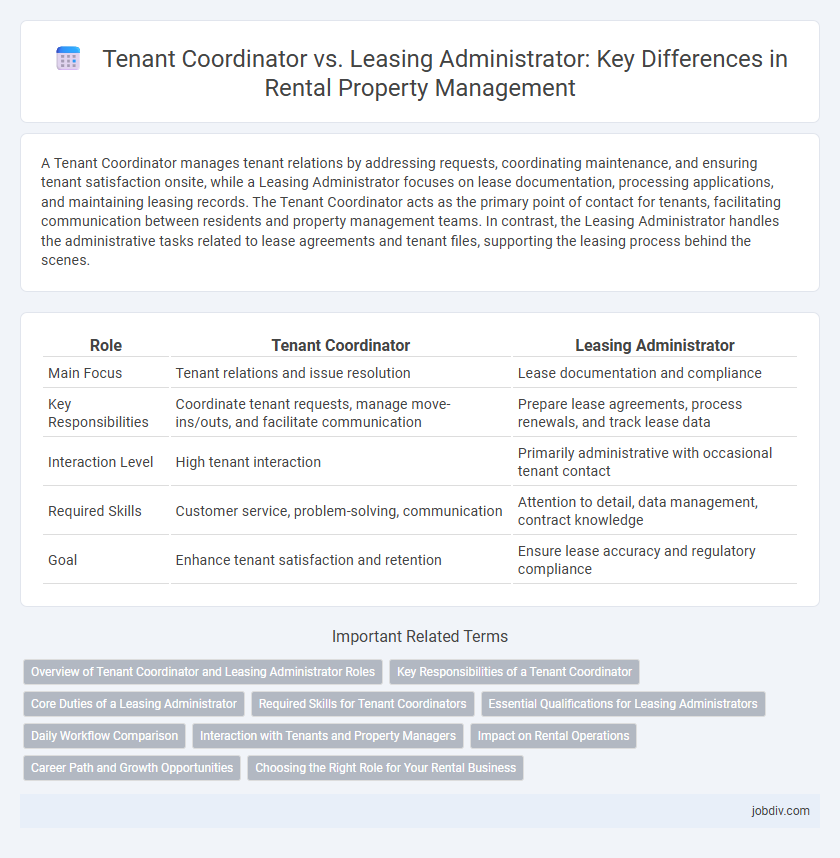A Tenant Coordinator manages tenant relations by addressing requests, coordinating maintenance, and ensuring tenant satisfaction onsite, while a Leasing Administrator focuses on lease documentation, processing applications, and maintaining leasing records. The Tenant Coordinator acts as the primary point of contact for tenants, facilitating communication between residents and property management teams. In contrast, the Leasing Administrator handles the administrative tasks related to lease agreements and tenant files, supporting the leasing process behind the scenes.
Table of Comparison
| Role | Tenant Coordinator | Leasing Administrator |
|---|---|---|
| Main Focus | Tenant relations and issue resolution | Lease documentation and compliance |
| Key Responsibilities | Coordinate tenant requests, manage move-ins/outs, and facilitate communication | Prepare lease agreements, process renewals, and track lease data |
| Interaction Level | High tenant interaction | Primarily administrative with occasional tenant contact |
| Required Skills | Customer service, problem-solving, communication | Attention to detail, data management, contract knowledge |
| Goal | Enhance tenant satisfaction and retention | Ensure lease accuracy and regulatory compliance |
Overview of Tenant Coordinator and Leasing Administrator Roles
Tenant Coordinators manage tenant relations by addressing tenant needs, coordinating move-ins and move-outs, and ensuring smooth communication between landlords and tenants. Leasing Administrators handle lease documentation, maintain lease records, process rental payments, and ensure compliance with lease agreements and property policies. Both roles are essential to effective property management but differ in focus, with Tenant Coordinators emphasizing tenant satisfaction and Leasing Administrators concentrating on lease administration and financial processes.
Key Responsibilities of a Tenant Coordinator
A Tenant Coordinator primarily manages tenant relations by addressing tenant inquiries, coordinating maintenance requests, and facilitating communication between tenants and property management. They ensure tenant satisfaction through timely resolution of issues and oversee move-in and move-out processes. These responsibilities distinguish them from Leasing Administrators, who typically focus on lease documentation, rent collection, and administrative duties.
Core Duties of a Leasing Administrator
A Leasing Administrator primarily manages lease documentation, processes rental applications, and ensures compliance with leasing policies and regulations. This role involves coordinating lease renewals, maintaining accurate tenant records, and facilitating communication between landlords and tenants. Unlike a Tenant Coordinator who focuses on tenant relations and issue resolution, the Leasing Administrator emphasizes administrative accuracy and lease management efficiency.
Required Skills for Tenant Coordinators
Tenant Coordinators require strong communication and interpersonal skills to effectively manage tenant relations and address concerns promptly. Proficiency in conflict resolution, organization, and scheduling is essential to coordinate move-ins, inspections, and maintenance requests. Expertise in property management software and knowledge of leasing policies further enhance their ability to support tenants and streamline operational workflows.
Essential Qualifications for Leasing Administrators
Leasing Administrators require strong organizational skills, proficiency in property management software, and a thorough understanding of lease agreements and compliance regulations. Essential qualifications include effective communication abilities, attention to detail, and experience handling tenant records and lease documentation. Knowledge of local housing laws and ability to coordinate with multiple departments ensures smooth leasing operations and tenant satisfaction.
Daily Workflow Comparison
Tenant Coordinators manage tenant communications, coordinate maintenance requests, and ensure smooth move-ins and move-outs, focusing on tenant relations and service quality. Leasing Administrators handle lease documentation, process applications, and maintain compliance with rental policies, emphasizing contract management and regulatory adherence. Both roles require collaboration with property management teams yet differ in their daily workflow priorities, where Tenant Coordinators prioritize tenant satisfaction while Leasing Administrators focus on administrative accuracy.
Interaction with Tenants and Property Managers
Tenant Coordinators serve as the primary point of contact for tenants, addressing their concerns and facilitating communication with property managers to ensure a smooth rental experience. Leasing Administrators handle lease documentation and compliance, working closely with property managers to manage lease agreements and maintain accurate records. Both roles require strong coordination skills, but Tenant Coordinators emphasize direct tenant interaction while Leasing Administrators focus on administrative support and lease processing.
Impact on Rental Operations
Tenant Coordinators streamline communication between tenants and property management, reducing response times and enhancing tenant satisfaction, directly improving rental operations efficiency. Leasing Administrators handle lease documentation and compliance, ensuring accurate record-keeping and adherence to legal requirements, which minimizes risks and supports smooth rental transaction processes. Together, these roles optimize operational workflows by balancing tenant relations with administrative precision in rental property management.
Career Path and Growth Opportunities
Tenant Coordinators primarily manage tenant relations and support lease administration, often serving as entry points into property management with opportunities to advance into Leasing Administrator roles. Leasing Administrators handle complex leasing documents, compliance, and financial reporting, offering career growth toward property management or real estate portfolio management. Both roles provide foundational experience for long-term career development in the rental and real estate industry.
Choosing the Right Role for Your Rental Business
Tenant Coordinators focus on managing tenant relationships, handling inquiries, and ensuring tenant satisfaction, which directly improves tenant retention and community engagement. Leasing Administrators specialize in processing lease agreements, maintaining leasing records, and ensuring compliance with rental laws, offering operational efficiency and legal accuracy. Selecting the right role depends on whether your rental business prioritizes tenant experience or streamlined lease management.
Tenant Coordinator vs Leasing Administrator Infographic

 jobdiv.com
jobdiv.com